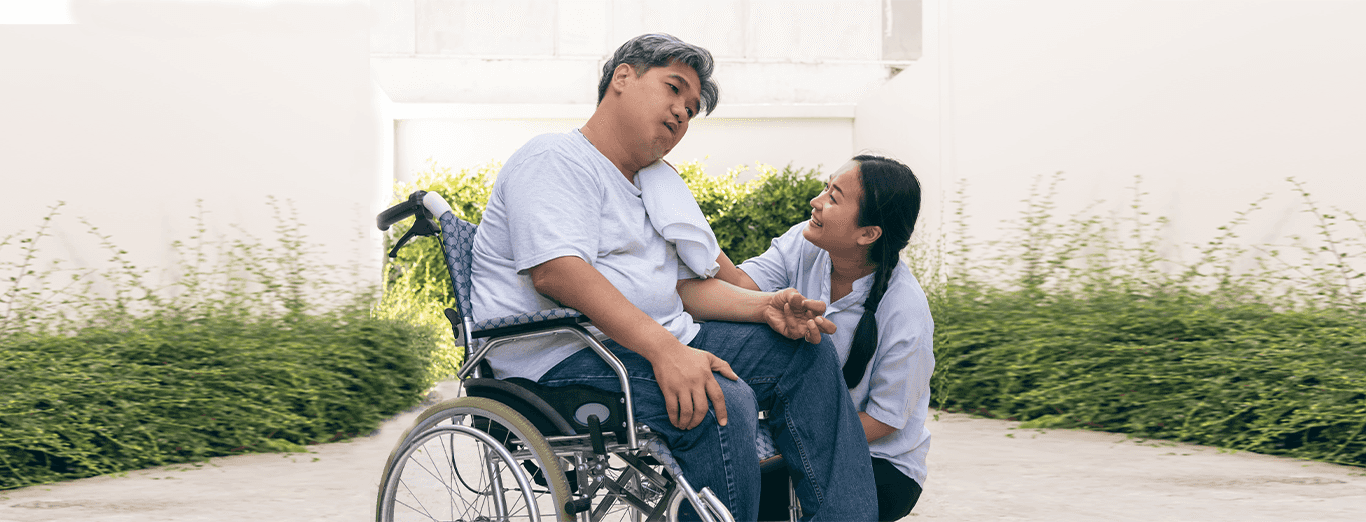
introduction to disability care
Disabilities or physical mobility impairment can occur at any age as a result of diseases, accidents, or inherited problems. In many circumstances, persons with disabilities require assistance with daily routines such as clothing, cleaning, personal care, bathing, meal preparation, errands, shopping, and other activities.
Many considerations must be addressed while caring for an elderly parent or a handicapped loved one. Depending on the degree of disability care at home required and the nature of the medical conditions, a nursing home may be the only option for some. However, in many cases, living at home is the greatest option for a family member’s mental and physical well-being, providing all needs are addressed.
This is where disability care at home comes into picture as a great help as it is a type of practical assistance that involves anything from cleaning and bathing to more complex necessities. To assist in the house, highly qualified disability caregivers can be hired.
Good care can help people with impairments live in peace with dignity by assisting them in functioning in society. Because each disabled person has unique challenges and has distinct needs, there is no one-size-fits-all answer. Home care for disabled people will involve a thorough examination to identify what support is necessary and to find the appropriate individual to provide that assistance.
It is simple to pick a disability home care provider if you know the benefits that come with in-home care and how to decide the services that will suit your loved one’s individual needs.
importance of disability care
There are several kinds of disability, both physical and cognitive, such as:
- Impaired vision
- Hearing impairment
- Physical handicap
- Physical handicap Illness
- Autism spectrum disorder (ASD)
- Ambulation or imbalance problems
- Dementia
- Alzheimer’s disease (AD)
- Cerebral palsy
What form of home care services is ideal for handicapped people depends on the severity of their condition. One might require significant physical care, others might merely require someone to remind them of medicine regimens or appointments, as well as assist them with daily life responsibilities or companionship.
Most home care providers primarily provide non-medical care and are accessible 24 hours a day, seven days a week. Aides in home care monitor vital signs and remind patients to take their medications, as well as providing particular care for ailments such as cancer, cardiovascular diseases, and diabetes. Some agencies also include hospice care, a client and family support group, and personal care services.
The first step is to evaluate how much care your family member will need or what level of caring for mentally challenged adults is required in a particular case. Experienced in-home care providers in your area will perform a consultation, giving you the opportunity to ask questions about the level of care physically challenged person or your loved one requires and match it to the types of care services available.
tips for disability care
The patients with physical or mental challenges are quite easy to face breakdowns hence here are some tips to help you in case you meet someone or want to help in such case scenarios:
- Assume that people with impairments are capable of managing their own medical treatment.
- Do not ask patients if they brought an assistant or a friend if they do not have someone to assist them.
- When referring to patients with impairments (e.g., person who is blind, person who uses a wheelchair, person with hearing loss), use “person-first” language unless the patient requests otherwise.
- Individuals with impairments and injuries have the right to participate in community events and activities.
- Participation in local events, concerts, or religious gatherings is critical to your loved one’s general health and well-being.
- Individuals can live independent, meaningful lives in the community with the help of home care hence do provide them with the best home care for disabled adults.
conclusion
Caregivers are frequently trained to care for persons with a variety of impairments, including vision, hearing, physical difficulties, and cognitive diseases such as Alzheimer’s, dementia, and autism. If your family member needs in-home care or a caregiver for special needs of adults, be aware that you have this choice. In case still have doubts do not hesitate and give a call at 1800 121 2323 and let “Portea” handle it for you!
Doctor Consultation
Nursing
Physiotherapy
Trained Attendant
Elder Care
Mother & Baby Care
Lab Tests
Medical Equipment
Speciality Pharma
Critical Care





